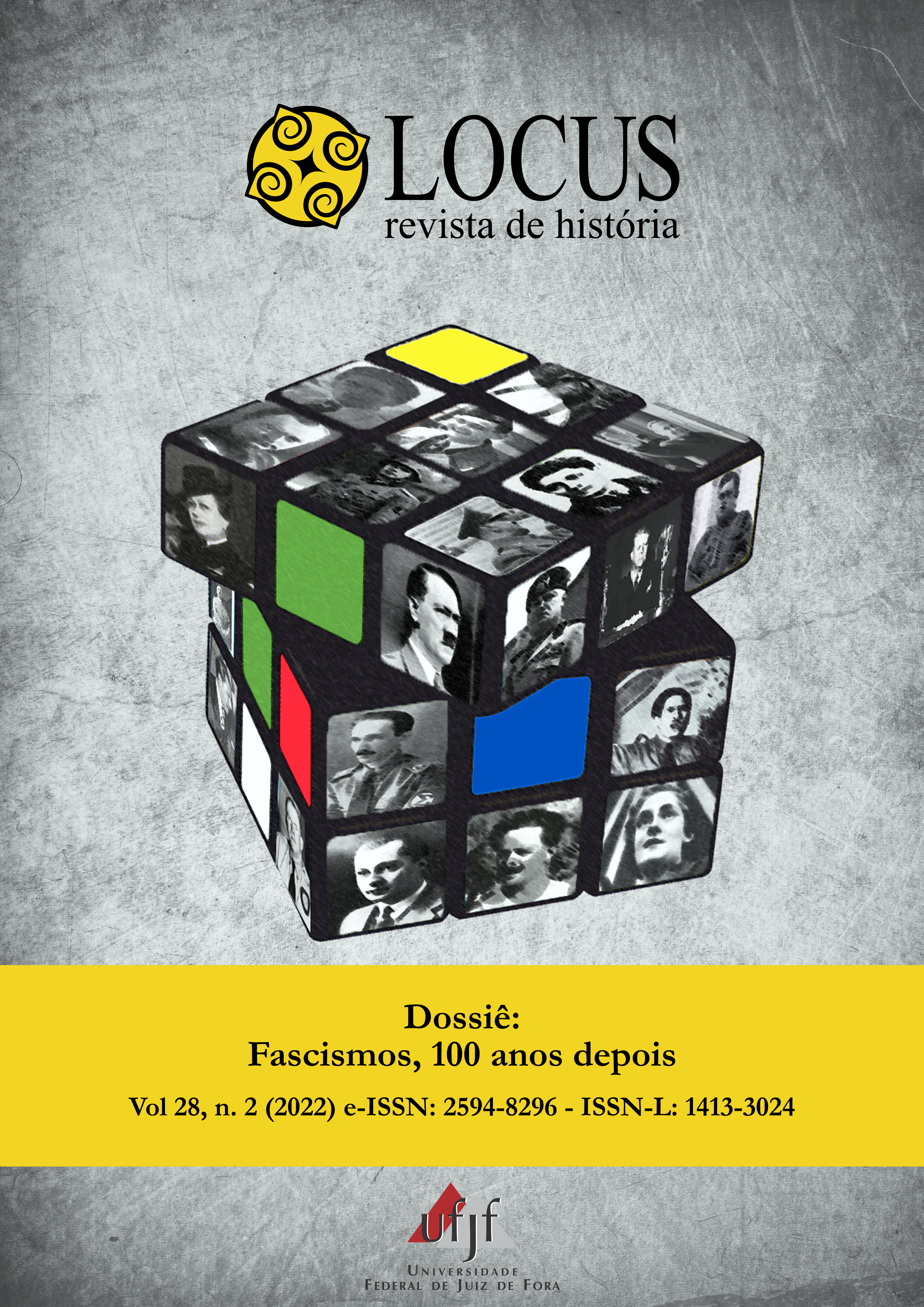Published 2023-08-01
Keywords
- Fascism,
- Ideology,
- Concepts
How to Cite
Copyright (c) 2022 Carlos Manuel Martins

This work is licensed under a Creative Commons Attribution 4.0 International License.
Abstract
In spite of all the definitions of fascism that were presented in the last decades and the “consensus” that was created around the definition proposed by Roger Griffin (which focuses on the ultranationalist and palingenetic core of fascism), authors like Michel Dobry have criticized the tendency to opt for what they see as “essentialist” approaches and to worry too much with classifications. Nevertheless, I argue that, although the more dynamic aspects of fascist ideology must be kept in mind, definitions and classifications are a necessary component of the work of the historian that tries to make sense of the era of fascism. For this reason, I here have the goal of arriving at a new definition of fascism by making use of the conceptual morphological approach, put forward by Michael Freeden, which has never been systematically applied to the study of fascism and can lead us to new and interesting conclusions about the nature of this ideology. This essay is, thus, a reassessment of a research that I previously carried out and shall be read as a refined version of that study, which tried to define fascism through the core concepts that are part of its conceptual pattern. As it is made clear in the text, the concepts that I believe to be central to fascism are: Nation, State, Synthessis, Revolution, Authority and Violence.
Downloads
References
- Arcand, Adrien. Programme et Reglements du Parti National Social Chrétien. Montreal: Parti National Social Chrétien, 1933.
- Bosworth, Richard. Mussolini. London: Bloomsburry, 2014.
- Campbell, Eric. The New Road. Sidney: Briton Publications Limited, 1934.
- Codreanu, Corneliu. For My Legionaries. Madrid: Libertatea, 1976.
- Déat, Marcel. “Le Partie Unique”. Em Documents Pour L’Histoire. Vol. I. Org. Philippe Randa. Paris: Éditions Déterma, 1998.
- Dobry, Michel. “Desperately Seeking ‘Generic Fascism’: Some Discordant Thoughts on the Academic Recycling of Indigenous Categories”. Em Rethinking the Nature of Fascism: Comparative Perspectives, org. António Costa Pinto, 53-84. London: Palgrave Macmillan, 2011. https://doi.org/10.1057/9780230295001_3
- Eatwell, Roger. Fascism: A History. London: Pimlico, 2003.
- Freeden, Michael. Ideologies and Political Theory: A Conceptual Approach. Oxford: Clarendon Press, 1996.
- Garau, Salvatore. Fascism and Ideology: Italy, Britany and Norway. London: Routledge, 2015. https://doi.org/10.4324/9781315849300
- Griffin, Roger. Fascism. Oxford: Oxford University Press, 1995.
- Griffin, Roger. “The Palingenetic Core of Generic Fascist Ideology”. Em Che Cos’è Il Fascismo? Interpretazioni e Prospettive Di Ricerche, org. Alessandro Campi, 97-122. Roma: Ideazione, 2003.
- Griffin, Roger. The Nature of Fascism. London and New York: Routledge, 2013. https://doi.org/10.4324/9781315003627
- Hitler, Adolf. My Struggle. London: Hurst & Blackett, 1939.
- Lindholm, Sven Olof. Svensk FRihetskamp. 1943.
- Mann, Michael. Fascists. Cambridge: Cambridge University Press, 2004.
- Martins, Carlos Manuel. From Hitler to Codreanu: The Ideology of Fascist Leaders. London: Routledge, 2019. https://doi.org/10.4324/9781003106043
- Mosley, Oswlad. The Greater Britain. London: BUF, 1932.
- Mussolini, Benito. “The Doctrine of Fascism”. 1932. Acedido a 11 de Agodsto de 2022. http://www.worldfuturefund.org/wffmaster/Reading/Germany/mussolini.htm
- Payne, Stanley. A History of Fascism: 1914-1945. Madison: University of Wisconsin Press, 1995.
- Preto, Francisco Rolão. “Para Além do Comunismo”. Em Obras Completas, org. José Melo Alexandrino, 161-212. Lisboa: Edições Colibri, 2015.
- Primo de Rivera, José Antonio. Anthology. Madrid: Ediciones FE, 1940.
- Primo de Rivera, José Antonio. Antologia en Español. Madrid: Ediciones Prensa del Movimiento, 1950.
- Saz, Ismael, Zira Box, Toni Morant, e Julián Sanz. “Introduction”. Em Reactionary Nationalists, Fascists and Dictatorships in the Twentieth Century: Against Democracy, org. Ismael Saz, Zira Box, Toni Morant, e Julián Sanz. London: Palgrave Macmillan, 2019. https://doi.org/10.1007/978-3-030-22411-0
- Thomàs, Joan Maria. José Antonio Primo de Rivera: The Reality and the Myth of a Spanish Fascist Leader. London: Palgrave Macmillan, 2019. https://doi.org/10.2307/j.ctv287sjss

